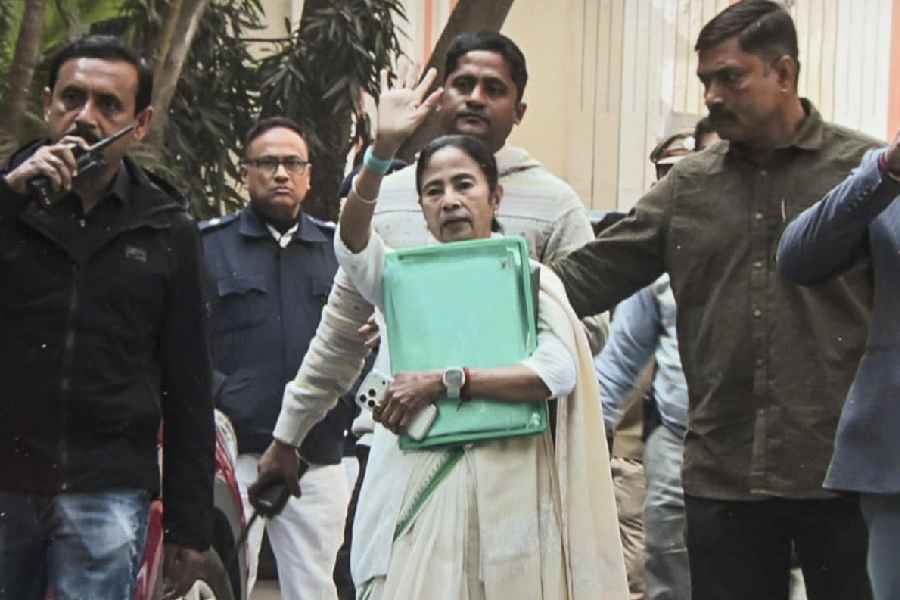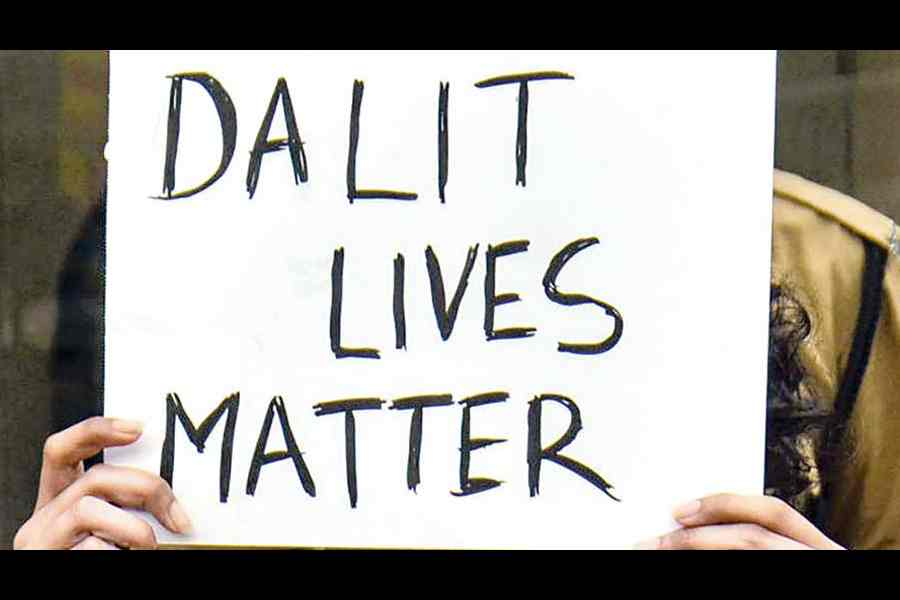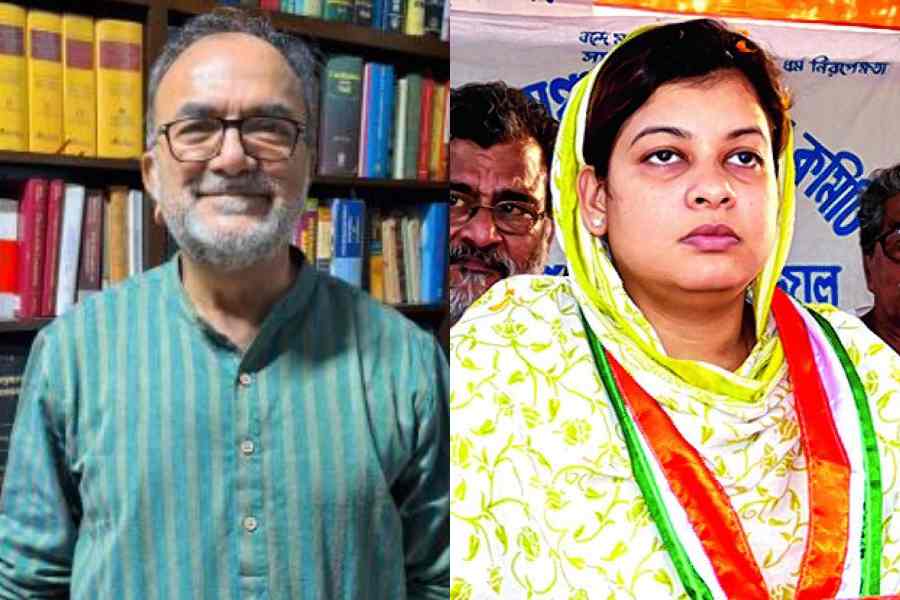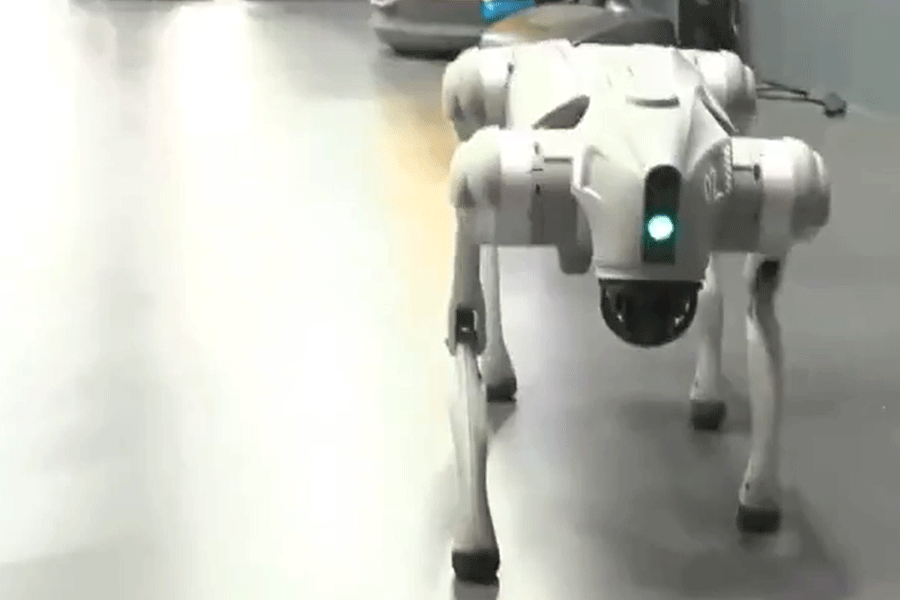 |
| Prince Charles cuts a birthday cake standing next to Sri Lanka’s President Mahinda Rajapaksa (second from left) and his wife Shiranthi at the presidential house in Colombo on Thursday. Earlier, asked by a reporter what he would tell Charles about the “dire” human rights record of Sri Lanka, Rajapaksa said: “We will not shake hands. In Sri Lanka we say Ayo Bowan. We do this whether it is King, Queen or a beggar.”(Reuters) |
Washington, Nov. 14: If the Commonwealth Heads of Government Meeting (CHOGM) opening in Colombo today had a prize for “special mention” in dealing with the intricacies of the Tamil problem that has bedevilled the summit, it ought to go to foreign secretary Sujatha Singh.
She made the best of a bad situation that domestic politics has placed India in at the CHOGM, and her meeting today with veteran Sri Lankan Tamil politician R. Sambanthan was evidence that diplomacy may salvage at least a part of what electoral compulsions had sought to entirely destroy.
Sambanthan arrived at the meeting with the foreign secretary accompanied by two Tamil National Alliance (TNA) members of Parliament, M.A. Sumanthiran and Suresh Premachandran.
What emerged from the meeting is a good starting point for future relations with Sri Lanka, possibly after the Lok Sabha elections next year under the next government.
Sujatha Singh and Indian high commissioner Y.K. Sinha, with others working behind the scenes, were able to extract a Tamil consensus at the meeting that it was solely for the government of India to decide on the presence of Prime Minister Manmohan Singh at the CHOGM.
“Whether the Prime Minister should have come or not, it is entirely for him to take” the decision, Sambanthan told reporters in Colombo after meeting the foreign secretary.
Multiple and contradictory opinion among Sri Lankan Tamils on the level of Indian representation at the CHOGM was one factor that had complicated a decision on the Prime Minister’s travel to Colombo this week.
Of those who met Sujatha Singh today, Sambanthan had publicly asked New Delhi to heed the opinion in Tamil Nadu, which was for a total boycott of the CHOGM by India.
Sumanthiran was for following the Canadian decision of a low-level representation while Premachandran had said the TNA, for its part, would have nothing to do with the CHOGM.
The consensus view that emerged today is a good augury for rebuilding ties with Colombo because the idea that its Tamil minority is determining New Delhi’s Sri Lanka policy is a red rag with President Mahinda Rajapaksa. It would have made any rapprochement a non-starter.
Faced with a lack of Sri Lankan Tamil consensus, Indian diplomacy had last month prevailed on the recently elected chief minister of the Northern Province, C.V. Wigneswaran, to write to the Prime Minister inviting him to Jaffna coinciding with the CHOGM.
Anticipating such a Jaffna visit, the Indian high commission in Colombo was fully geared for what would have been a historic trip to the Tamil heartland by the Prime Minister.
Internal opinion in the ministry of external affairs (MEA) was that Manmohan Singh should fly first to Jaffna and address a huge public meeting of Tamils there.
Some MEA officials were of the view that it would have replicated a public meeting in Calcutta by Nikolai Bulganin and Nikita Khrushchev in 1955 during a visit by the Soviet leaders that showed the way for future ties with Moscow.
They argued, with diminishing feedback from the political leadership, that with Jaffna Tamil sentiment solidly behind him, the Prime Minister would then have arrived at the CHOGM as a champion of the Sri Lankan Tamil cause, which was how New Delhi was viewed before the Indian Peacekeeping Force was sent to the island by Rajiv Gandhi.
It will not be lost on external affairs minister Salman Khurshid, who is standing in for the Prime Minister at the CHOGM, that this strategy, which Indian officials had vainly lobbied for with their political bosses, has been seized upon and cleverly put into action, albeit on a smaller scale, by another Indian. But he does not belong to India.
Deepak Obhrai, parliamentary secretary to Canada’s minister of foreign affairs and international human rights, had gone first to Jaffna and ostentatiously made a stop at the Elephant Pass cemetery in northern Sri Lanka where he laid a wreath “in memory of all innocent Sri Lankan victims of violence”.
The “third battle of Elephant Pass” was a turning point in the final campaign against the Liberation Tigers of Tamil Eelam (LTTE) in 2009. It has special significance for Tamils because hundreds of Eelam fighters had lost their lives trying to capture it from the Sri Lankan army in 1991 at a critical point in the civil war.
Photographs of Obhrai unfurling a banner at the cemetery made it to top visual news images worldwide today. An MP from Alberta and past president of the India-Canada Association, Obhrai is Khurshid’s Canadian counterpart at the CHOGM.
Sujatha Singh also set the ball rolling for future engagement with the post-LTTE leadership by inviting chief minister Wigneswaran to visit India.
South Block recognises that in order to engage the Tamil leaders on the island, it is a pre-requisite to deal with the national leadership in Colombo as opposed to boycotting them the way Tamil Nadu politicians are arguing for.
Indian diplomacy is anxious to preserve the gains from the country’s biggest development assistance project to date as a grant. At a cost of $270 million, it involves building 50,000 houses for Tamils displaced by the civil war.
In addition, tractors, boats, bicycles, fishing nets, farm tools and computers have been pouring into Tamil pockets under Indian government assistance. Infrastructure assistance including harbour repairs, railway track laying and regional airport runway repairs in the northern province have also been part of Indian help to the long-suffering Tamils.
The diplomatic argument was that by going to Jaffna, and onward to Colombo for the CHOGM, Manmohan Singh would have showcased these efforts and cast himself as a saviour of Tamils instead of seizing defeat from the jaws of a potential victory by boycotting the summit of heads of government.










